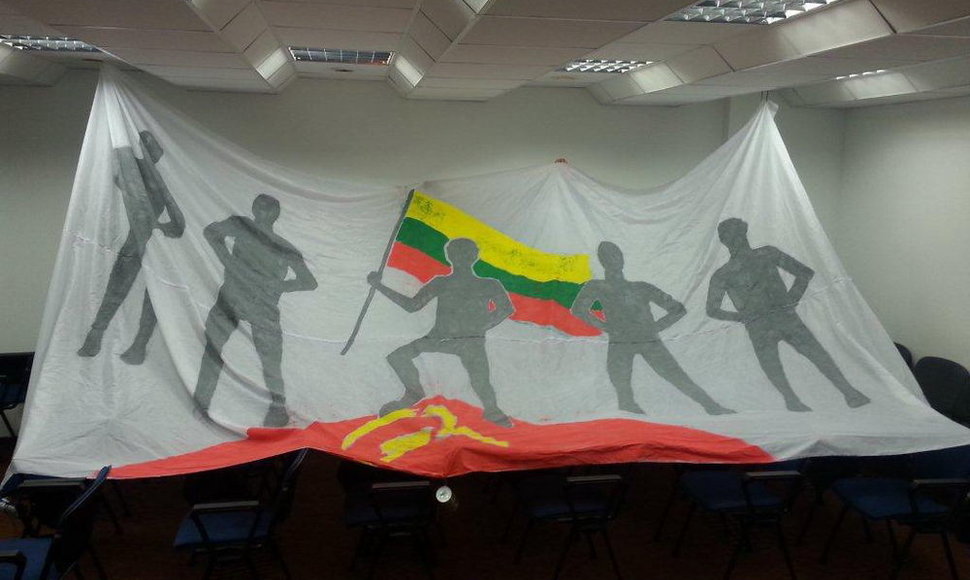According to official reports, nine youngsters, six of them minors, were arrested on Wednesday night after hanging a huge banner from atop an overbridge on Geležinio Vilko street in Vilnius.
It was also reported that the police opened a preliminary investigation into disturbance of public order. Curiously, though, officials strictly refused to release photos of the banner that got the youngsters in trouble. On Thursday afternoon, however, the prosecutors gave in and published a photo. The banner shows five silhouetted figures, one of them holding a Lithuanian flag, trampling on Soviet symbols – hammer and sickle. The media instantly dubbed the banner “anti-Soviet” while the public wondered whether the police had not overreacted.
Politicians jump on the bandwagon
The banner was unfurled on the eve of 9 May. In the Soviet Union, the date was a national holiday celebrating victory against Nazi Germany. In Russia, as well as Belarus and Ukraine, the holiday is still observed today.
Online commentators accused the police of Russian sympathies, failure to give up Soviet mentality, etc. Meanwhile several members of parliament turned to the Police Chief for explanation.
“In reaction to media reports about the police arresting several youths yesterday for allegedly disturbing public order [...], I asked the Chief of Police to give explanation about this incident. Might it not have been better for the police to not have wasted money persecuting these young people for showing their intolerance for symbols of the former Soviet regime. I hope that people in Lithuania will not be prosecuted for anti-Soviet activities,” conservative MP Vilija Aleknaitė-Abramikienė posted on her Facebook page.
Some detainees familiar to the police
Another press release circulated by the police on Thursday afternoon only poured oil on the flame. “It must be noted,” it said, “that civil activism and the right to freedom of expression are only compatible with democratic values and other basic human rights when they do not break the law. The police will do their duty to protect ideals of tolerance and non-discrimination postulated in international treaties as priorities for EU countries.” Some members of the public read this as a warning that expressing anti-Soviet sentiments two decades after Lithuania's cessation from the USSR was a crime.
It was only on Thursday evening that it emerged the situation was much more complicated. Even though the morning reports alleged that “none of the detainees have previous record of similar activities,” a memorandum, released after working hours, claimed otherwise.
“Police officers of Vilnius County [...] have established that one of the youngsters behind the raising of the banner is a suspect in a case of inciting hatred against a national, racial, ethnic, religious, or other group of people and linked to desecration of Jozef Pilsudski's grave in Rasų Cemetery last November,” the new police report read.
It also claimed that “four other [suspects] could be related to an incident on 22 April in Subačiaus Street, where swastikas and anti-semitic slogans “Heil Hitler” and “Juden raus” were found painted on a pole and a roadside kerb. The incident is also currently under investigation.”
Under police surveillance
Sources tell 15min that the preliminary investigation opened on Thursday is looking not only into disturbance of public order but also into incitement to ethnic or racial hatred. The Lithuanian laws expressly prohibit hate speech and incitement to discriminate against a person or a group of people based on “gender, sexual orientation, race, nationality, language, origin, social status, faith, or convictions.”
“The banner was just an excuse for the arrest. It was done in order to prevent something much more serious that was being planned. This is no joke, the police has no intention of waging wars with patriotic kids,” the sources, wishing to remain anonymous, told 15min.
According to information given to 15min, the group behind the incident has been under police surveillance for some time already. The youngsters were arrested during a well-planned police operation. No further details have been released by the prosecutors yet.
“Everything is much more complicated and serious than it might look. However, until the public is given further details, the situation will continue to seem ambiguous and bizarre,” the source says.
Neonazis
One of the youngsters arrested on Wednesday is linked to an incident last November in Vilnius Rasų Cemetery. A cardboard box was left on the grave of Polish General Jozef Pilsudski with inscriptions “TNT”, “Attention, bomb”, “Call the cops”, and “Death for Poles”.
Several days later, five “members of an informal radical organization” were arrested. The police carried out searches in their homes and later brought charges of incitement to ethnic hatred and desecration of a grave. The investigation is still ongoing.
After the searches, the police released photos of the detainees' homes, showing walls decorated with Adolf Hitler portraits and Nazi posters.
Anti-semitic smears
The police also informs that four of the detained youngsters “might have had a part in the incident” this year in Subačiaus Street, Vilnius. On 22 April, swastikas and inscriptions “Heil Hitler” and “Juden raus” were found painted on a pole and roadside kerb.
The site of the smears is of symbolic importance. It is close to the former Vilnius Ghetto which was liquidated by the Nazis in 1943. Its Jewish residents were taken either to labor camps or the extermination site in Paneriai.
A labour camp set up by the Nazis was operating across the street, where Jews, selected from Vilnius Ghetto before its liquidation, were forced to work repairing cars and machinery.












